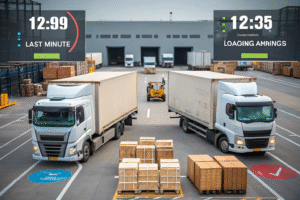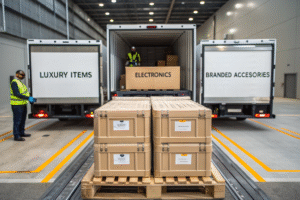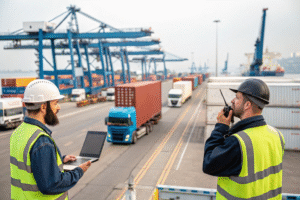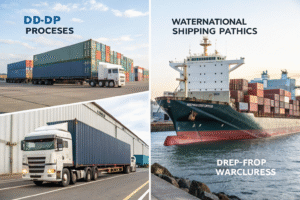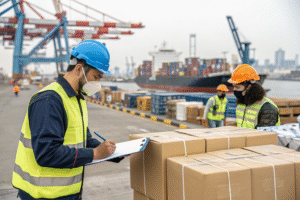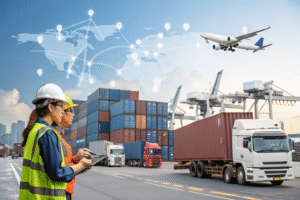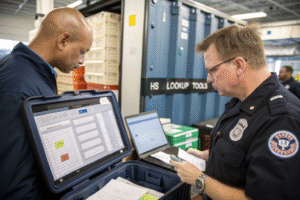Many importers worry about customs, duties, and delivery problems. If you've ever felt overwhelmed handling overseas shipments, you're not alone.
DDP (Delivered Duty Paid) is a shipping term where the seller takes full responsibility for delivery, customs clearance, and duty payment. It’s the most buyer-friendly Incoterm in international trade.
For buyers in the U.S. and EU, DDP simplifies the entire import process. You get predictable costs and fewer surprises. Let me explain how it works, and why more of my clients are switching to DDP every year.
What does DDP mean in international shipping?
Shipping terms can be confusing. You’ll hear acronyms like EXW, FOB, CIF, and DDP thrown around. But among all these, DDP stands out for its buyer convenience.
In DDP shipping, the seller handles everything: shipping, customs clearance, and duties. The buyer receives goods directly at the destination without dealing with customs or hidden fees.

What exactly is covered under DDP?
Let’s look at a simplified DDP shipment from China to the U.S.:
| Shipping Stage | Responsibility | Covered by Seller? |
|---|---|---|
| Factory Pickup | Seller | ✅ |
| Export Customs | Seller | ✅ |
| Freight Booking | Seller | ✅ |
| Import Customs (USA) | Seller | ✅ |
| Duties & Taxes | Seller | ✅ |
| Last-Mile Delivery | Seller | ✅ |
This model gives importers total clarity. You receive goods at your warehouse door, already cleared through customs, and fully paid for.
At GeeseCargo, we use DDP for many U.S. clients importing accessories, apparel, or promotional items. They don’t need to register with CBP, or worry about HS codes and customs brokers. We handle it all.
Why is DDP important in cross-border logistics?
DDP simplifies operations for buyers, especially first-time importers or small businesses. It reduces:
- Delays due to missing customs documents
- Extra fees from destination port agents
- Legal liability over taxes and classification errors
If your team lacks import compliance experience, DDP is the safest route.
DDP vs. DAP: What’s the key difference?
Many people confuse DDP with DAP — but the difference matters a lot, especially when your cargo hits customs.
The key difference: DDP includes duties and taxes paid by the seller, while DAP (Delivered at Place) requires the buyer to handle customs clearance and pay duties upon arrival.

How do DDP and DAP compare?
Here’s a side-by-side breakdown:
| Item | DDP (Delivered Duty Paid) | DAP (Delivered at Place) |
|---|---|---|
| Customs Clearance | Seller | Buyer |
| Import Duties & Taxes | Seller | Buyer |
| Delivery to Buyer | Seller | Seller |
| Importer of Record | Seller (or forwarder) | Buyer |
| Buyer Involvement | Minimal | Moderate to High |
| Surprise Fees Risk | Low | High |
So in DDP, you don’t need to act as the importer. You don’t deal with paperwork, duty calculation, or customs delays.
In DAP, your shipment can get stuck if:
- You haven’t appointed a customs broker
- You don’t have an importer tax ID
- You didn’t prepay duties or know how to handle HTS codes
That’s why I often say: If you’re not a logistics pro, choose DDP.
When would DAP be better than DDP?
DAP works when:
- You already have a U.S.-based company and broker
- You want full control over customs entries
- Your products qualify for special duty programs (e.g., GSP)
In all other cases, especially B2C or small-scale B2B, DDP gives you speed and peace of mind.
Benefits of using DDP for US and EU importers
Shipping across borders is risky — unless someone else handles the risk for you. That’s what DDP does.
Using DDP terms gives U.S. and EU importers clear pricing, faster delivery, and fewer customs complications. It’s ideal for businesses with limited logistics resources.

What are the main advantages of DDP?
Here’s what our DDP clients in the U.S. tell us they appreciate most:
| Benefit | Impact |
|---|---|
| Fixed, all-in pricing | No surprise port or tax charges |
| No customs knowledge required | GeeseCargo handles it all |
| Faster delivery | No hold-ups at import terminals |
| No registration needed | You don’t act as importer of record |
| Better forecasting | Easier to manage inventory and cash flow |
One of our clients in New Jersey told me they used to get customs clearance wrong — until they switched to DDP. Now, their orders arrive in under 25 days with no emails from customs.
Is DDP good for Amazon FBA shipments?
Yes — especially for EU or U.S. Amazon sellers who ship directly to fulfillment centers. DDP ensures your cargo is cleared, duties are paid, and no Amazon delivery appointments are missed due to broker delays.
We offer DDP shipping directly to:
- Amazon warehouses (U.S., UK, DE, FR)
- 3PL centers
- Brick-and-mortar stores or distributors
It’s how we help our clients scale, even if they don’t have a U.S. office or VAT number.
Common risks and challenges with DDP shipping
While DDP is buyer-friendly, it comes with challenges. The seller (or forwarder) takes on more responsibility — and not all are ready for it.
The biggest DDP risks are hidden charges from inexperienced sellers, incorrect customs declarations, and unclear liability for delays or inspections.

What can go wrong with DDP?
Here are real-world problems we’ve seen:
| Risk | What Happens |
|---|---|
| Underpaid Duties | Seller miscalculates, cargo is held at customs |
| Fake DDP Promises | Seller quotes DDP but asks buyer to clear at port |
| Delays at Destination | Poor tracking, unclear delivery timelines |
| Poor HS Code Use | Results in extra taxes or seizure |
| Broker Confusion | Unclear who is listed as importer of record |
That’s why working with an experienced freight forwarder like GeeseCargo is essential. We don’t just “say” DDP — we manage every piece of it. That includes:
- Real duty calculation
- Proper paperwork
- Real-time tracking
- Final-mile delivery coordination
How can you avoid DDP problems?
Ask your supplier or forwarder:
- Can you send me a line-item quote including duties?
- Are you using your own U.S. customs broker?
- Who is listed as importer of record?
- How will I receive proof of customs clearance?
We make this simple at GeeseCargo. Our DDP clients get PDF customs clearance reports, delivery receipts, and clear instructions every time.
Conclusion
DDP shipping terms remove guesswork, lower risk, and make importing from China to the U.S. or EU simpler than ever. If you value predictability and peace of mind, DDP is the smart choice — and a trusted forwarder like GeeseCargo is your best partner to make it work.

